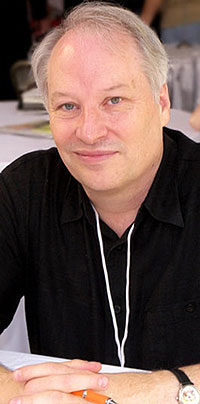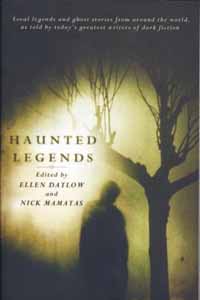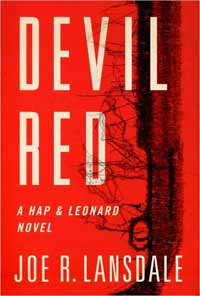Stoker Spotlight: 13 Questions with Joe R. Lansdale, author of “The Folding Man”
 Joe R. Lansdale received the 2010 Bram Stoker Award for Superior Achievement in Short Fiction. He is the author of more than a dozen novels, including Savage Season, Devil Red, The Drive-In, Dead in the West, The Night Runners, The Bottoms, and Under the Warrior Sun. He is also the author of many short stories and collections, including By Bizarre Hands, Writer of the Purple Rage, God of the Razor and Other Stories, and Deadman’s Road, as well as numerous comics and graphic novels, such as Jonah Hex: Two Gun Mojo and Blood and Shadows. Several of his stories have been adapted for movies and television. Among his numerous awards are sixteen Bram Stoker Awards and the Grand Master Award from the World Horror Convention. Learn about the Champion Mojo Storyteller at http://www.joerlansdale.com/.
Joe R. Lansdale received the 2010 Bram Stoker Award for Superior Achievement in Short Fiction. He is the author of more than a dozen novels, including Savage Season, Devil Red, The Drive-In, Dead in the West, The Night Runners, The Bottoms, and Under the Warrior Sun. He is also the author of many short stories and collections, including By Bizarre Hands, Writer of the Purple Rage, God of the Razor and Other Stories, and Deadman’s Road, as well as numerous comics and graphic novels, such as Jonah Hex: Two Gun Mojo and Blood and Shadows. Several of his stories have been adapted for movies and television. Among his numerous awards are sixteen Bram Stoker Awards and the Grand Master Award from the World Horror Convention. Learn about the Champion Mojo Storyteller at http://www.joerlansdale.com/.
 How would you describe “The Folding Man?”
How would you describe “The Folding Man?”
As a gonzo monster story about a very unusual monster, all of it based on an old legend. It was originally about a man in black, then a man on horseback or in a buggy, and then it was a black car. I took that legend and thought, how could I go at this in the wildest manner possible. I also liked the idea of there being some kind of world we don’t know about, and it was the source of many things we believed in, legends and myth and the like. Another dimension that slips into ours at Halloween, for example.
Tell us about what inspired you to write “The Folding Man.”
I wanted to write it because I wanted to write a pure all out fast paced horror story, and at the same time, I wanted to write an absurdist tale.
What was your writing process like for the story? Do you have a regular writing routine or schedule?
I normally write about three to five pages a day, five to seven days a week, every morning, about nine to twelve usually, sometimes a little earlier start, and a little earlier finish. Only now and again do I work part time in the afternoon or evenings. On this one, though, I found myself working more, and getting up in the middle of the night and writing on it, and then within just a few days, I was done.
What most attracts you to writing horror?
I’m not truly sure. I think it has to do with a lifelong love of the genre, but I write plenty of things other than horror. I’ve actually, novel wise, written more crime and non-horror books. My stories are often odd contemporary fantasy or absurdist as much as horror. But I do love horror, and have loved it since I was a kid. Comics and movies led me to it at first, I think, and then the stories. Poe, Blackwood, Machen, and later Robert Bloch, Richard Matheson, Charles Beaumont, Ray Bradbury, and so many others. They spoke to me.
What are some of the themes you explore in your writing? Are there any topics you consider “out of bounds” even for horror fiction?
I don’t know that I consider anything out of bound, but there are some things I don’t write about now and again. That is my personal choice. Horror is supposed to be uncomfortable, but there are certainly things I might consider off limits. Sometimes, even if I write negatively about something, I might write it in such a way that I don’t explain that, but that the story should. You can’t be the cliff notes for all readers. I explore whatever theme is on my mind at the time, but bigotry and racism pop up a lot in my work. I’ve seen it and it’s ugly.
 What are you writing now?
What are you writing now?
A young adult novel titled Fender Lizards.
What do you see as horror literature’s role in contemporary culture?
Same as it’s always been. First to entertain, but entertainment can be serious, and about serious themes and subjects. Different themes and different subjects appeal to different writers. But I think at its best it deals with social issues. I also think when you’re good at it the reader thinks that what you’re doing is simpler than it actually is. BUBBA HOTEP, one of my stories is goofy and fun and odd and vulgar and about a mummy in a rest home, but it’s just as much about aging and how we perceive it and fear of death and disease. I consider most of my work much more serious than some perceive it. Though some is just for fun, and that’s it.
Tell us about an experience or experiences with the HWA that influenced your writing or helped you as a writer.
The early on community was the main thing. The sharing of market possibilities, meeting editors, agents and writers. Ultimately, it’s all up to you to do the work, though. Nothing else subs, but it’s nice to get inspired by the fact that you’re not alone, but the bottom line is you have to learn to live with that aspect, because writing is best when it’s not a spectator sport.
What advice would you share with new horror writers? What do you think are the biggest challenges most writers face?
Write. That’s it. Put your ass in a chair and write, and when you’re not writing read, see movies, listen to radio shows, music, and live life.
What are three of your favorite horror stories?
“The Upper Berth,” by Crawford. “Terror at Twenty Thousand Feet,” Matheson, “The Next In Line,” Ray Bradbury, and if you ask me to tomorrow I can give you three totally different stories. It depends on the day. Too many to just list three.
What’s your favorite Halloween memory or tradition?
Trick or Treat.
Given a choice, trick? Or treat?
Treat. I don’t like the trick stuff much.
Barbarians or zombies—who would make better neighbors?
If that’s your choice, maybe a different neighborhood.



